D.C. Circuit Review – Reviewed: En Banc’ing It
“[P]etitions for rehearing en banc are frequently filed but rarely granted.” So says the Handbook of Practice and Internal Procedures of the D.C. Circuit. Yet this week’s post is all about en banc.
First, the D.C. Circuit sat en banc on Monday to hear Allegheny Defense Project v. FERC and on Tuesday to hear Committee on the Judiciary v. McGahn/House of Representatives v. Mnuchin. Audio is here and here. The Court presumably will issue decisions pretty soon. The rule of thumb for the Supreme Court is that it “generally takes cases to reverse.” That’s probably a fair bet here too. But we shall see.
Second, the Supreme Court announced that it will largely follow the D.C. Circuit’s en-banc-by-phone-call approach to oral argument — which goes from senior to junior in terms of questioning. One difference: Chief Justice Roberts will go first while Chief Judge Srinivasan went last. Another difference: I don’t think the Supreme Court will allow oral argument to go on for hours. But again, we shall see (or, rather, hear).
Third, the Supreme Court this week proposed amendments to Federal Rule of Appellate Procedure 35’s en banc procedures:
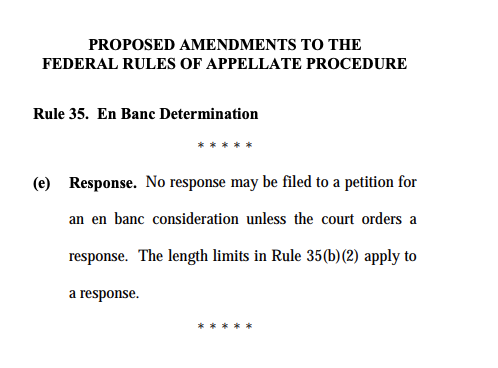
This isn’t the most exciting change. But if you study delegation, the Rules process is remarkable. By statute, the Supreme Courts has power to adopt (certain) rules:
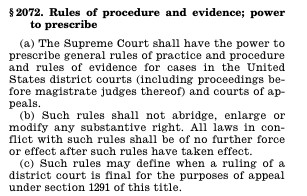
And then Congress has power to veto those rules. But if Congress doesn’t act, the rules go into effect.
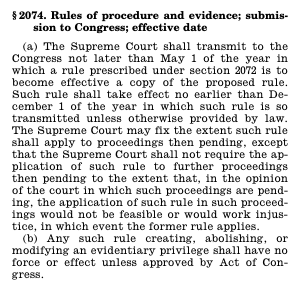
This process may be open to gamesmanship; the Supreme Court potentially can pick rules that Congress may not want but yet also can’t muster the votes to reject. I don’t this is such a rule though.
Finally, fourth, Matt Schettenhelm offered these fascinating (ugh) tweets:
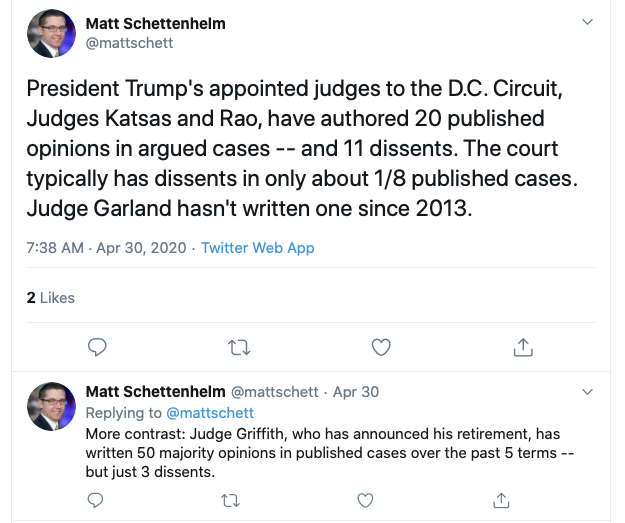
The first step to en banc review is often (though not always) panel disagreement. Although we still have a small sample size,* it looks like Judges Katsas and Rao are closely following in the footsteps of the judges they replaced. Both Judge Brown and then-Judge Kavanaugh dissented a lot. (By contrast, Judge Garland and Judge Griffith do not.) Respectful dissent isn’t a bad thing; as I’ve noted before, “agreement is good but not at the expense of independent judgment.” And as Kavanaugh’s track record confirms, the Supreme Court often pays close attention to those dissents. Even so, however, this is an interesting trend.
The D.C. Circuit decided three cases this week … without dissent.
In Pharmaceutical Manufacturing Research Services, Inc. v. FDA: Judge Rao (joined by Judges Henderson and Wilkins) addressed the FDA’s approval process for new drugs. PMRS sought approval to market an opioid drug under a label designating it as having an “ADR” — short for “Abuse Deterrent Formulation.” The FDA denied PMRS’s application because it did not believe the evidence supported that claim. The D.C. Circuit upheld that decision. Notably, Rao found a scrivener’s error. Here is 21 U.S.C. § 355(c)(1):
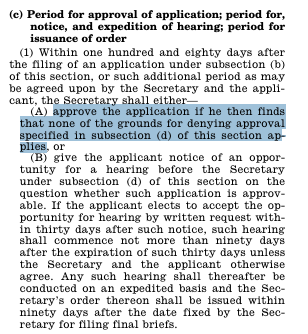
And here is 21 U.S.C. § 355(d):
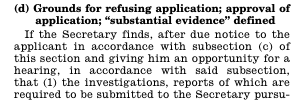
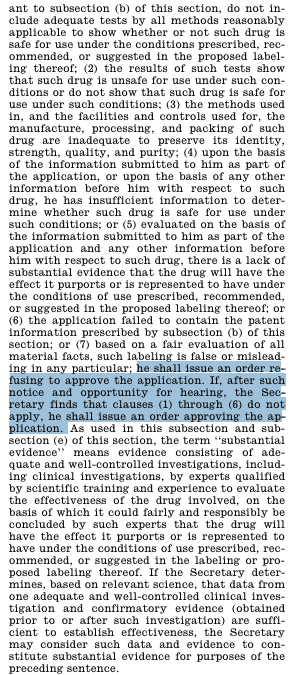
So what is the status of (d)(7)? The “shall issue an order refusing to approve the application” language refers to all seven subparts; the “clauses (1) to (6)” language does not refer to d(7).
Here is Judge Rao’s resolution:
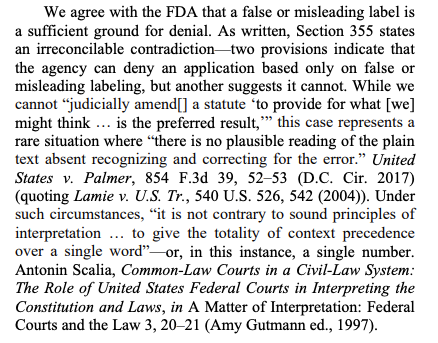
Interesting. (There is more in this case, but that is a good sample.)
In re: Public Employees for Environmental Responsibility is also interesting, especially if follow mandamus (and you should). Judge Griffith (joined by Judges Henderson and Tatel) addressed a shared statutory duty of the National Park Service and the Federal Aviation Administration to regulate air tours over national parks. The Air Tour Management Act of 2000 requires the FAA, “in cooperation with” the NPS, to “make every effort” to establish management plans for issuing permits to air tour vendors within two years of receiving the first application. The agencies, however, “bickered” for years. Congress eventually amended the Act to allow for “voluntary agreements” in lieu of management plans at some parks. But that has not really worked either. The Court determined that mandamus is warranted because the agency has taken way too long. (There is more going on in this case too. If you are a real D.C. Circuit nerd expert, you’ll be interested in the Court’s application of Telecommunications Research & Action Center v. FCC, 750 F.2d 70 (D.C. Cir. 1984).)
Finally, in Young v. SEC, Judge Wilkens (joined Judge Sentelle) denied review of an SEC decision because the petitioner, acting pro se, missed a filing deadline by one day. Why? He sought review in the D.C. Court of Appeals rather than the U.S. Court of Appeals for the D.C. Circuit. That is not enough for equitable tolling (even assuming it is not a jurisdictional deadline). Judge Williams concurred, stating that he believed the court was precluded from applying equitable tolling, but expressing concern:
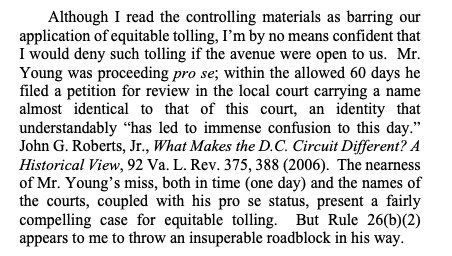
The decision reminds me of a post of mine from 2017: District of Columbia Circuit Court of Appeals. Here is the heart of that post:
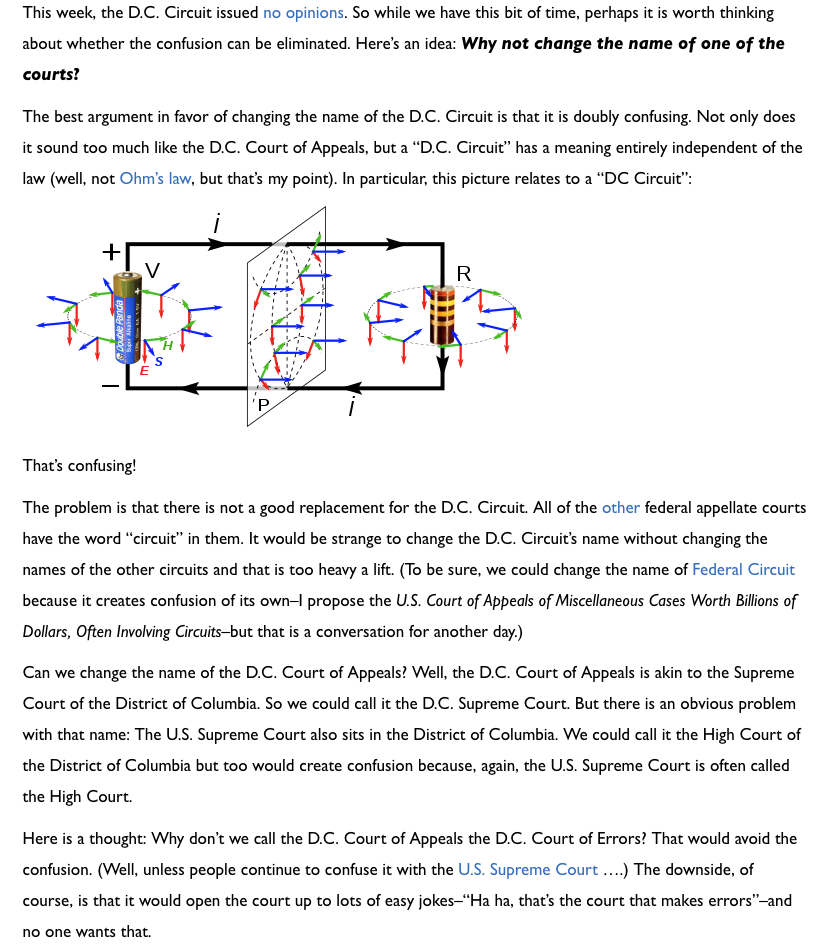
This name confusion has gone on for far too long. Maybe the en banc D.C. Circuit can persuade Congress to fix it.
* I asked my (wonderful) librarian to pull the cases. Here is the list:
J. Katsas Majority Opinions
Loumiet v. United States, 948 F.3d 376 (D.C. Cir. 2020)
DCH Regional Medical Center v. Azar, 925 F.3d 503 (D.C. Cir. 2019)
Humane Society of the United States v. Perdue, 935 F.3d 598 (D.C. Cir. 2019)
Planned Parenthood of Wisconsin, Inc. v. Azar, 942 F.3d 512 (D.C. Cir. 2019)
In re Rail Freight Fuel Surcharge Antitrust Litigation, 934 F.3d 619 (D.C. Cir. 2019)
Trudel v. SunTrust Bank, 924 F.3d 1281 (D.C. Cir. 2019)
Twin Rivers Paper Co. LLC v. SEC, 934 F.3d 607 (D.C. Cir. 2019)
United States v. Islam, 932 F.3d 957 (D.C. Cir. 2019)
Wayne J. Griffin Electric, Inc. v. Secretary of Labor, 928 F.3d 105 (D.C. Cir. 2019)
American Hospital Ass’n v. Azar, 895 F.3d 822 (D.C. Cir. 2018)
ANR Storage Co. v. FERC, 904 F.3d 1020 (D.C. Cir. 2018)
Big Bend Conservation Alliance v. FERC, 896 F.3d 418 (D.C. Cir. 2018)
Delaware Riverkeeper Network v. FERC, 895 F.3d 102 (D.C. Cir. 2018)
Old Dominion Electric Cooperative v. FERC, 898 F.3d 1254 (D.C. Cir. 2018)
St. Francis Medical Center v. Azar, 894 F.3d 290 (D.C. Cir. 2018)
J. Rao Majority Opinions
In re Air Crash Over the Southern Indian Ocean on March 8, 2014, 946 F.3d 607 (D.C. Cir. 2020)
Gulf South Pipeline Company, LP v. FERC, No. 19-1074 (D.C. Cir. Apr. 10, 2020)
Pharmaceutical Manufacturing Research Services, Inc. v. FDA, No. 18-1335 (May 1, 2020):
Ted Cruz for Senate v. FEC, No. 19-cv-908 (DDC Mar. 30, 2020) (joint opinion)
United States v. Carr, 946 F.3d 598 (D.C. Cir. 2020)
United States v. Marshall, 946 F.3d 591 (D.C. Cir. 2020)
Carlson v. Postal Regulatory Commission, 938 F.3d 337 (D.C. Cir. 2019)
District No. 1, Pacific Coast District, Marine Engineers Beneficial Ass’n, AFL-CIO v. Liberty Maritime Corp., 933 F.3d 751 (D.C. Cir. 2019)
J. Katsas Dissents
United States v. Butler, No. 17-3080 (D.C. Cir. Apr. 14, 2020) (Katsas, J., dissenting)
Davis v. District of Columbia, 925 F.3d 1240 (D.C. Cir. 2019) (Katsas, J., dissenting in part)
Liberterian Nat’l Committee, Inc., v. FEC, 924 F.3d 533 (D.C. Cir. 2019) (Katsas, J., dissenting in part)
Philipp v. Federal Republic of Germany, 925 F.3d 1349 (D.C. Cir. 2019) (Katsas, J., dissenting from the denial of rehearing en banc)
Reid v. Hurwitz, 914 F.3d 670 (D.C. Cir. 2019) (Katsas, J., dissenting) (amended and superseded by Reid v. Hurwitz, 920 F.3d 828 (D.C. Cir. 2019) (Katsas, J., dissenting))
Reid v. Hurwitz, 920 F.3d 828 (D.C. Cir. 2019) (Katsas, J., dissenting)
Singletary v. Howard University, 939 F.3d 287 (D.C. Cir. 2019) (Katsas, J., dissenting)
Simon v. Republic of Hungary, 911 F.3d 1172 (D.C. Cir. 2018) (Katsas, J., dissenting)
Trump v. Mazars USA, LLP, 941 F.3d 1180 (D.C. Cir. 2019) (Katsas, J., dissenting from denial of rehearing en banc)
United Steel v. Mine Safety & Health Administration, 925 F.3d 1279 (D.C. Cir. 2019) (Katsas, J., dissenting in part)
Alcresta Therapeutics, Inc. v. Azar, 755 Fed. App’x 1 (D.C. Cir. 2018) (Katsas, J., dissenting)
J. Rao Dissents
Natural Resources Defense Council v. Wheeler, 955 F.3d 68 (D.C. Cir. 2020) (Rao, J., dissenting)
Trump v. Mazars USA, LLP, 940 F.3d 710 (D.C. Cir. 2019) (Rao, J., dissenting)
In re Committee on the Judiciary, 951 F.3d 589 (D.C. Cir. 2020) (Rao, J., dissenting)
J. Katsas Concurrences
In re Federal Bureau of Prisons’ Execution Protocol Cases, 955 F.3d 106 (D.C. Cir. 2020) (Katsas, J., concurring)
Woodhull Freedom Foundation v. United States, 948 F.3d 363 (D.C. Cir. 2020) (Katsas, J., concurring in judgment)
People for the Ethical Treatment of Animals v. Dep’t of Agriculture, 912 F.3d 641 (D.C. Cir. 2019) (Katsas, J., concurring)
Rhea Lana, Inc. v. United States, 925 F.3d 521 (D.C. Cir. 2019) (Katsas, J., concurring)
American Society for Testing and Materials v. Public.Resource.Org, Inc., 896 F.3d 437 (D.C. Cir. 2018) (Katsas, J., concurring)
Palmieri v. United States, 896 F.3d 579 (D.C. Cir. 2018) (Katsas, J., concurring)
United States v. Sitzmann, 893 F.3d 811 (D.C. Cir. 2018) (Katsas, J. concurring)
J. Rao Concurrences
In re Federal Bureau of Prisons’ Execution Protocol Cases, 955 F.3d 106 (D.C. Cir. 2020) (Rao, J., concurring)
I suspect there will be more soon ….
D.C. Circuit Review – Reviewed is designed to help you keep track of the nation’s “second most important court” in just five minutes a week.



